The Papua New Guinea Institute of Biological Research (PNGIBR) is a Papua New Guinea (PNG)-based not for profit association formed to ensure a biologically sustainable future for PNG and teach the men and women of Papua New Guinea about the environmental and biodiversity problems that we are facing.
- We conduct much-needed research.
- We give national biologists and conservationists the skills they need to preserve their biodiversity.
- We ensure information is shared with policy makers, landowners and PNG citizens.
- And we integrate traditional knowledge and customs with modern concepts of conservation to come up with models that will work in Papua New Guinea.
Our Logo
Our logo, drawn by PNG artist Benson Avea, shows two of our nation’s iconic animals and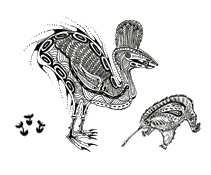 vital components of what we are striving to protect:
vital components of what we are striving to protect:
- The Cassowary, a bird as tall as a human, roams the rainforest living off fruit and thus renews our forests through its ecosystem service of dispersing thousands of seeds.
- The Long-Beaked Echidna is the world’s most primitive living mammal (it lays eggs like reptiles), but now faces possible extinction through habitat destruction and over-hunting for food.
The cassowary represents the interrelationships that sustain our forest and the echidna represents the fragility of our unique creatures in the face of human impact. If we work as informed stewards of our biological diversity the ecosystem services that we all depend upon will continue to serve us, while cultural icons like the cassowary and echidna continue to inspire us.
Our History
The Papua New Guinea Institute of Biological Research, Incorporated (PNGIBR) was officially registered as a not for profit organisation under Section 7 of the Associations Incorporation Act of PNG on 25th March 2008 and has been determined by the PNG Internal Revenue Commission to be a tax-exempt charitable organisation. PNGIBR was founded by a group of PNG biologists for the purpose of ensuring a biologically sustainable future for Papua New Guinea.
We developed expertise through a training program that began in 1996 with Conservation International and continued under the Wildlife Conservation Society (WCS) 1999-2007. This program trained over 300 PNG students and professionals in project design, field techniques, statistics and data analysis, and project write-up and presentation, it funded and mentored 17 PNG Honors students and it led to scholarships for 14 PNG students to obtain Masters degrees at top international universities. When WCS shifted its PNG priorities away from capacity building its staff decided to form the PNGIBR to continue this program.
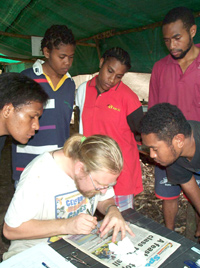
We felt the training program was a proven success and was crucial to PNG’s future. PNG citizens must acquire the knowledge and skills required to preserve their own flora and fauna and to run their own programs. The program’s vision had always been that the trainees of the program would eventually take it over, with PNG nationals acting as mentors and role models for future generations with a branching and multiplying effect, and with PNG nationals on an equal footing with colleagues from overseas. With our years of experience with CI and WCS, our Masters education abroad, and a shared commitment to continue building national conservation capacity we decided to take on the challenge of founding and leading this new organisation. Our passion for PNG-run conservation efforts gave birth to the Papua New Guinea Institute of Biological Research.
We began operations on July 1st, 2008.
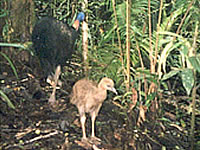 Our Vision
Our Vision
Our Vision is to be a leading institution made up of scientific colleagues dedicated to conserving Papua New Guinea’s flora, fauna and ecosystems to ensure a biologically sustainable future.
Our Mission
Our Mission is to effectively contribute to the conservation of Papua New Guinea’s biological diversity and sustainable future.
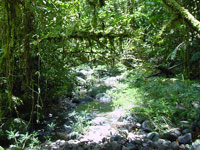 We will:
We will:
- Conduct useful biological research in collaboration with relevant stakeholders to ensure a rich national heritage for our society’s livelihood and spiritual well-being.
- Train aspiring national biologists to ensure that PNG citizens have the skills they need to conserve their biodiversity in an effective way.
- Disseminate our research findings to the scientific community, to the people of PNG, and to policy makers for use in conservation and management efforts.
- Respect the cultural differences among the people and communities we work with and integrate their traditional ecological knowledge and traditions with modern concepts of conservation to come up with culturally sensitive models that will work in PNG.
- Collaborate with and aid others who can contribute to this mission.
Our Beliefs and Values
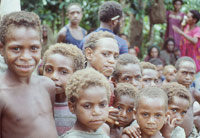 PNG’s rich cultural heritage needs to be part of any plan for a biologically healthy future. We are uniquely qualified to design and implement such interventions. Effective and innovative solutions will come from those who can straddle the gap between modern science and our ancient cultures. Clearly, many of our citizens grasp the cultural and traditional side of the equation, but few have also had the benefit of training in modern conservation science. Because many of the threats to our nation come from outside our borders and outside our traditions, PNG needs an organisation that can understand these outside threats while at the same time promoting traditional solutions that will be accepted by its citizens.
PNG’s rich cultural heritage needs to be part of any plan for a biologically healthy future. We are uniquely qualified to design and implement such interventions. Effective and innovative solutions will come from those who can straddle the gap between modern science and our ancient cultures. Clearly, many of our citizens grasp the cultural and traditional side of the equation, but few have also had the benefit of training in modern conservation science. Because many of the threats to our nation come from outside our borders and outside our traditions, PNG needs an organisation that can understand these outside threats while at the same time promoting traditional solutions that will be accepted by its citizens.
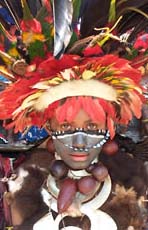 We are an enthusiastic team of highly trained Papua New Guineans ready to meet this challenge. We have powwwraduate training at top overseas universities and extensive practical experience in Papua New Guinea. Our goal is to create an entirely new voice in PNG’s conservation, education and research arena that will speak equally well to international and national policy-makers, and to rural people living traditionally in PNG.
We are an enthusiastic team of highly trained Papua New Guineans ready to meet this challenge. We have powwwraduate training at top overseas universities and extensive practical experience in Papua New Guinea. Our goal is to create an entirely new voice in PNG’s conservation, education and research arena that will speak equally well to international and national policy-makers, and to rural people living traditionally in PNG.
In the past conservation, research and education were mainly led by expatriates, many on short visits to PNG and often directed top down from abroad. PNGIBR is different we are building PNG’s ability to conduct research, conservation, and education from within. We will provide the solid information our country needs for biodiversity conservation, climate change mitigation and
sustainability in a culturally appropriate and acceptable way. At the same time we will continue to train a new generation of PNG biologists and conservationists to continue the work.
Our Organisational Structure and Governance
- Our Management Team consists of all MSc/PhD level staff scientists. This Team leads the organisation and votes on matters with a majority rule. Management annually elects two Co-Directors to lead the organisation with annual staff evaluations, finances, planning, and donor liaison. We have chosen a non-hierarchical, democratic structure in which we are all equal colleagues. We value cultural and gender diversity in our organisation and value each other’s opinions. Thus we have an inclusive, collective decision-making and management style that combines our PNG traditional ways with western organisational structure.
- Our Board of Advisors/Directors are all PhDs (biology, anthropology and
law) and aid with mentoring, fund-raising, legal issues and financial
oversight.
